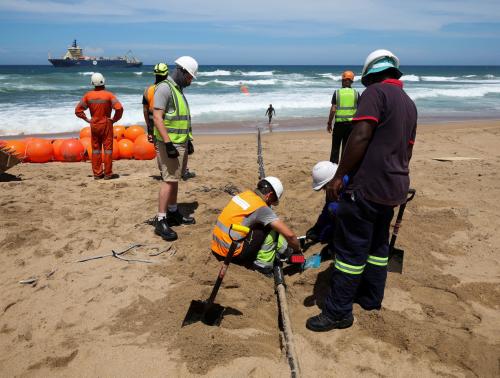“India is in transition,” says Raj Cherubal, director of Chennai Connect, an urban planning think tank. “We are an upside down country, with almost no local control. But we are starting to turn things around.” Raj laid out his vision for a “confederation of city-states” in the evocative 2007 article, “The Coming Mutinies.”
As India’s states and cities become more confident in asserting themselves, local leaders are playing a bigger role in national affairs. And the more that Indians realize that their economy drives foreign policy, the more important India’s states become.
This local activism can cut two ways on the global stage. Late last year, a leading regional party in Kolkata (the Trinamool Congress) forced Prime Minister Singh’s government to abandon new investment laws allowing Wal-Mart and other big box stores to open in India.
But for every time an Indian steps away from the global economy, two Indians step forward. Chief ministers from Gujurat to Andra Pradesh to Tamil Nadu are competing with one another to attract foreign investment.
As Praveen Chakravarty told me: “The core question in India right now is: ‘Can we trust the states, or not?’” Praveen is experimenting, both in business and in politics; he is a Tamil running a bank in Mumbai. He has worked in the government in New Delhi and has stayed connected to Congress party politics.
Nearly all Indians accept that there is a red-line for local control that no one crosses. When it comes to national security, New Delhi is in charge.
For instance, Tamil Nadu cares passionately about two national security issues: the conflict in Sri Lanka (involving a Tamil minority), and the general protection of sea lanes. On these matters, Tamil Nadu’s officials, politicians, and leaders know that Delhi decides. Even Tamil Nadu’s parliamentarians know that their influence is limited.
As conservative luminary and satirist Cho Ramaswamy explained, even if Tamil leaders once considered breaking away, “Separatist propaganda never took off here. We are too Indian at our core.”
That deference to Delhi is the default position. “Ours is a unitary constitution with federal features,” says Cho. “No truly federal constitution would have the central government capable of dismissing state governments.”
“When Nehru drafted the constitution, he wanted a union, full-stop. He did not want a federal union,” Lawrence Prabhakar, a fellow at the Centre for Security Analysis, patiently explained to me. In other words, Nehru set to work for almost three years on a constitution that would create a nation. It was precisely the fear that regions and states would start to set their own agendas that Nehru was guarding against.
India’s constitution, which turns 62 next week, binds thirty-five states and territories, helping to forge Unum out of massive and overlapping Pluribus. It recognizes dozens of languages (at least 30 of which have over one million speakers), dozens of religions, and hundreds of distinct regions. It is the lengthiest constitution in the world, more elephant than elegant, weighing in at over 117,000 words. The U.S. constitution, even with all of its amendments, is only 7,000 words.
All of this was done in the fear of secession… but not necessarily Tamil secession. It was done in fear of further secession in the north. Pakistan had been carved out as a separate nation, and Kashmir’s sovereignty remained in dispute. That combined with a strong, socialist belief in central planning to build a powerful central state.
“Nehru included a right of accession, but not a right of secession,” said Lawrence Prabhakar. Indeed, the constitution seeks to preempt secession. The Central government thereby has the power to invoke “the President’s rule,” dismissing any state government. It did so numerous times from 1950 until 1995, when it dissolved the state government of Tamil Nadu.
But notably, it has not dismissed a state government since then. That is the transition Raj Cherubal discussed.
The constitution also lays out procedures for letting new states emerge out of larger ones – as long as they don’t leave the Union. “The constitution is designed to bend, but not to break,” said Lawrence Prabhakar.
So if Raj Cherubal and Praveen Chakravarty are right, in the future, the bending is going to have to be that of a yoga master. Regional parties – such as the DMK and AIADMK in Tamil Nadu – have become critical to coalitions in the national parliament. Local parties and state level politicians also have become entrepreneurs. They are aggressive in investing in roads and bridges, in coal and nuclear power stations, in education and health-care.
They’re doing that because they must. “Even the illiterate know that you can no longer just blame Delhi,” said Raj Cherubal. That is the future of Indian politics.
The Brookings Institution is committed to quality, independence, and impact.
We are supported by a diverse array of funders. In line with our values and policies, each Brookings publication represents the sole views of its author(s).


Commentary
The Illiterate Know You Can No Longer Just Blame Delhi
January 20, 2012